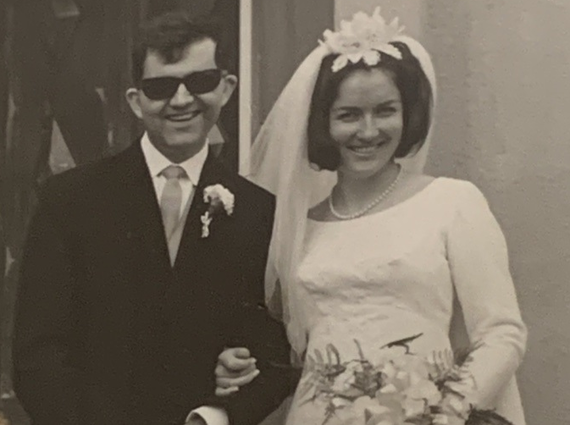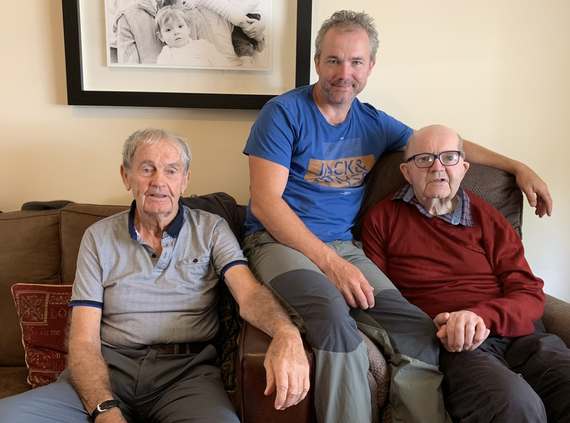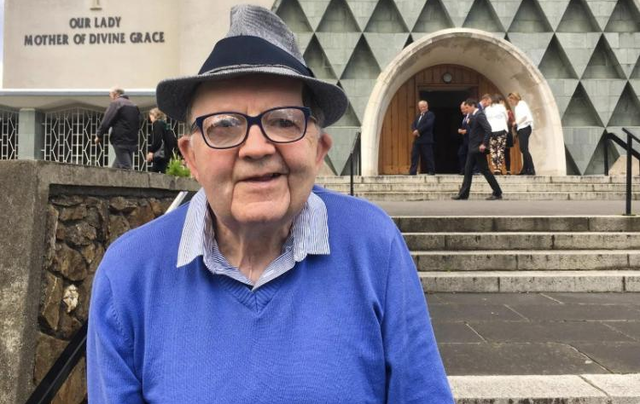Vincie Dolan from Co. Leitrim was only 27 when he suffered a catastrophic injury while playing football at Gaelic Park in 1965. Michael Fitzpatrick talks to Dolan about his eventual triumph over adversity, which included losing his wife when she was only 39.
She waited with the others. Outside, by the fence. A simple yet effective structure, comprised of timber and wire, constructed decades earlier, by sons and fathers of a previous generation.
Immediately beyond that partition was a narrow boreen which led in one direction to Ballinamore, and in others, to Fenagh, Keshcarrigan and Drumshanbo. All just miles from Aughnasheelin, the tiny Leitrim hamlet where Mary Ann Dolan and her family had lived, laughed, loved and, like the son they’d been waiting for, left, for decades.
Her other children waited too. There were nine in all and, but for teenage twins Ann and Kay, they had grown up by then. Neighbors, relatives, his old teammates, school pals and men he’d worked with at Ballinamore Creamery, all gathered by the homestead listening out for the car.
Read more
Mary Ann was strong, a survivor. Having lost her husband Jack 17 years earlier she’d been left with nine children to raise, alone, against so many odds, in the harsh economic climate of 1950s Ireland.
Now, one of her children was coming home. Another survivor, but only just. His American adventure was at a sudden and regrettable end, and she’d have to prove her strength once more.
He was en route. The final leg of his odyssey almost complete. Peter Vincent (“Vincie”) Dolan was coming home.
It was unlike before, when he’d arrive amidst a hum of excited anticipation. This trip was not by choice, but necessity. He was home, they hoped, to recover.
AFTER 16 weeks comatose in an American hospital, Vincie had six more months of rehabilitation in the U.S. and then more treatment at a Dublin facility. Now he was back to where he'd climbed trees and chased girls, played cowboys and kicked a ball.
The car arrived, and Mary Ann’s second eldest son, Father Leo, stepped out. Vincie’s fiancée, Kathleen Cafferkey, then appeared, as pretty as they’d remembered, yet now there was a look of anxiety etched into her delicate features.

Vincie and Kathleen on their wedding day in 1967.
The tears, threatening all afternoon, like rain itching to seep from darkening Leitrim clouds, finally broke free as arms reached out to hold her, and reassure her, that they’d always be there to help them ease back into a life that had taken so much from them all.
Father Leo gently assisted Vincie onto Leitrim soil. Despite it all he was still here. There had been talk that he would not make it.
His U.S. adventure was over, and his American dream lay shattered on a sports field in The Bronx.
Unable to walk unaided, Vincie couldn’t speak, was legally blind, had difficulty hearing, would be prone to stroke-like symptoms and would never be able to work again for the rest of his life.
Vincie Dolan was 27 years old.
At 20 he’d left for New York, in 1958. A Gaelic football fanatic, Vincie had been working, had many friends and a large, close-knit family, but he was anxious to try bigger, more exciting things. While Leitrim may have had greener pastures, things didn’t get much bigger, or more exciting, than New York City.
Vincie was the third eldest child of Mary Ann and Jack. He’d been enthralled by New York stories, having heard them from his beloved father who was, in fact, born in the U.S. and tragically passed away at the age of 49, in 1949.
This left Mary Ann to raise Vincie and his brothers Joe (who served as a Catholic priest until his passing in 2019), Leo (now Father Leo), Paddy, Jackie, Jimmy and Tony (now Brother Tony) who were all just boys at the time, while twins Kay and Ann were mere babies.
According to Ann, “Mam told him not to leave, that he’d be better off staying and joining the gardai, but his heart was set on New York and that was it. Off he went.”
IN New York, Vincie got a job with the Metropolitan Transportation Authority driving buses, before joining the U.S. Army.
He continued playing football, joining the local Leitrim side, winning the New York Championship alongside many lads that would become lifelong pals.
It was during this time that he was to meet the love of his life, Mayo girl Kathleen Cafferkey. According to Vincie’s cousin Pidgie Murray (nee McTague, his pal Pat Murray’s now-wife, and Kathleen’s best friend at the time), “It was love at first sight. We were at a dance in Midtown Manhattan and after she saw Vincie she whispered to me, ‘That’s the man I’m going to marry.’”
Kathleen and the Leitrim full-back got acquainted and before long were “going steady.” The two couples would often double date, with Pat, a now-retired New York City firefighter, smiling and remembering the fun times the couples had together.
Read more
“Vincie and I were roommates. Once we thought we’d impress the girls by inviting them over for a meal at our place in Sunnyside. It didn’t work out, as when Kathleen and Pidgie arrived and Vincie turned on the stove, I think for the first time ever, dozens of cockroaches dashed across the floor escaping the heat. The girls were shocked, so we decided to go out for dinner instead!”
In early 1965, after being honorably discharged from the U.S. Army, Vincie joined the NYPD, graduating later that year from the Police Academy.
He had an adoring fiancée, a packed social life, a large extended family in the U.S. (his cousins, the Cramptons had settled there too) and dozens of pals. The young Aughnasheelin native had it all
Until, that is, one afternoon in May 1965, when Vincie Dolan’s world came crashing down.
SUNDAY, May 16, 1965, was a day like any other in New York. Crowds of immigrants made their way from neighborhoods all over the five boroughs, and further afield in Long Island, Connecticut, Westchester and New Jersey, to enjoy an afternoon of football and hurling at the city’s GAA headquarters, Gaelic Park, at West 240th Street and Broadway in The Bronx.
On the schedule was a clash between old rivals Kerry and Leitrim. The game itself was a typical encounter between two strong footballing sides, both chasing the championship.
An adrenaline-fueled affair, the game always carried the faint yet real threat of serious injury. Luckily, however, very few players had been badly hurt during a game at Gaelic Park.
That was about to change.
Vincie, at full-back, was crouched down, holding the ball, considering as quickly as he could what options he had in order to stop another Kerry attack. He was attempting to switch the direction of play away from the Leitrim goal and back upfield towards his teammates on the forward line, where perhaps they’d nick a point or even a goal.
In the midst of this maneuver, as the Kerry attack tried to regain possession, Vincie received a substantial blow to the side of the head. It’s not certain whether it was a boot or a knee which arrived, forcefully, at full-speed, knocking him down, but it quickly became apparent that this was no run-of-the-mill injury.
Says Pat Murray, “We knew right away that something serious was wrong. We’d seen so many injuries over the years, but when Vincie didn’t get up and brush himself off as he’d normally do, even after the strongest challenge, we knew it was very serious.”
Vincie lay unconscious on the grass of Gaelic Park. It would be months before he opened his eyes.
Players from both sides were frantic. While some stared in disbelief at the tragedy unfolding before them, others prayed or broke down in tears.
He was taken to Jewish Memorial Hospital at 196th Street and Broadway where he remained, motionless and comatose, for over four months.
Says Leitrim native and long-time friend and former teammate of Vincie’s Mike Carty, now a successful New York-based businessman, “We were devastated. We didn’t know until the next day the full extent of it. It was just such a huge shock for everyone. We’d seen other injuries of course, but nothing like what happened Vincie. The word was, he was going to die.”
Kathleen visited Vincie daily and stayed by his bedside, hoping and praying.
‘She was just so beautiful and smart,” says Pidgie. “She really kept everyone going. She was so strong and had such great faith that he’d get better.”
Kathleen spent over four months visiting Vincie, talking, praying and waiting.
Finally, he woke. With his speech, sight and hearing severely affected, he was unable to walk or use much of his right side. It was going to be a long, difficult road ahead.
Months of rehabilitation followed. Kathleen’s vigils by his bed, until she’d leave for a few hours sleep before coming back to do it all over again, holding his hand, telling him all her news, as he lay there, motionless, was heartbreaking for the family to watch.
There was then a difficult conversation, but one which had to take place.
Vincie’s brothers Father Leo and Father Joe approached her. Nobody, they informed her, would think any differently if she were to step aside and move on, without Vincie.
She was a young, ambitious, smart woman in one of the most exciting cities in the world. He had spent four months in a coma and faced an uncertain future.
It didn’t matter. Vincie was still that handsome chap she’d spotted across a dance floor. The boy she’d danced with. Spoken of. The girlish giggles with her pals.
The man she fell in love with, and told her best friend that she wanted to marry. Kathleen was not going to step aside. Vincie’s family couldn’t love her more.
THEY moved home, married, and some years later welcomed sons Phelim (January 1970), then Leo (July 1972). They’d been dealt extraordinary hardship, but were coping as well as they could.
Then, in 1975, the Dolan family was handed another crushing blow.
Following a number of misdiagnoses where it was thought she’d been suffering from mastitis, a not-uncommon inflammation often associated with breast feeding, Kathleen was informed that she had breast cancer.
She had a mastectomy in 1975 and the family moved back to the U.S., primarily for its superior healthcare.
They settled in New Jersey, the boys started school, and Vincie continued his rehabilitation until Kathleen’s health began to deteriorate rapidly as her cancer spread.
With Vincie’s sight and speech still greatly affected, and she herself being seriously ill, it was time to make a decision. With heavy hearts, it was decided that the boys, Leo and Phelim, would move back to Ireland, temporarily, to stay with Kathleen’s sister Mary and her husband John, in Belmullet, Co. Mayo. It was yet another uncertain time for the Dolans.
As her health continued to suffer, the weeks spent without her boys became too much. Kathleen could not go on any further without them so she flew home especially for Leo’s seventh birthday, in July 1979, before taking him and Phelim, now nine, back to New York.
The scene of an adoring mother, with her beloved husband and two little boys, tragically, didn’t last long. After a few rallies, Kathleen Cafferkey, the incredible tower of strength from the west of Ireland, just weeks after little Leo’s seventh birthday, passed away. She was 39 years old.
After one enormous, life-changing tragedy, the Dolans had been dealt another.
Says Mike Carty, “How he progressed after being so near death. It was an amazing thing, the recovery he made. Nobody expected it. Being legally blind, to lose his wife so tragically and raise his boys. An incredible family.”

Vincie (right), pictured with his son Leo and brother, Father Leo, at home in Kilcloon.
VINCIE’S son Leo, now 48, says, that despite everything, “We’d very happy childhoods in New York. Then, after Mam died, we went to Kilcloon, where we lived next door to Dad’s sister Ann, and her husband (Garda) Mick. They were second parents to us, and helped enormously with our growing-up. It was like open house, I’d be raiding their fridge and watching their TV, and vice-versa!
“Uncle Mick was super, he did so much for us, and Ann would do a lot of what any mother would do for us, going to meet our teachers, bringing us on days out and so on. A very happy childhood.”
Vincie’s mother, Mary Ann, eventually passed away at 97, in 2001. Says Ann, “It affected her greatly, what happened to Vincie. I’m not sure she ever fully got over it.”
Vincie and Kathleen’s boys, Leo and Phelim, are now married and settled down with families of their own, and live very close to their father in Co. Meath.
Vincie has remained upbeat, despite everything he’s encountered. Says Ann, “He never got depressed. Only around the time of Kathleen’s anniversary would he get a little down, but he’d try not to show it for the sake of the boys.”
Upon meeting him at his Kilcloon, Co. Meath home, I remarked upon what a beautiful part of the countryside it was. All green, the hedges, trees, fields, even the GAA flags, green for Meath, partnered with gold, occasionally spotted on gates, trees and shop windows, the Kilcloon folk showing their support for their county.
All except proud Leitrim man Vincie Dolan, who looked at me, smiled, and whispered, “I can’t stand Meath people!” before cracking up laughing.




Comments